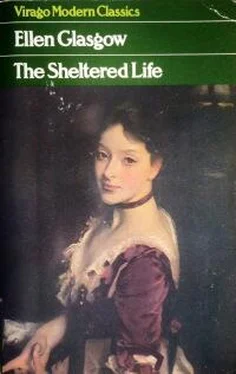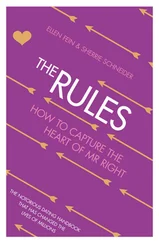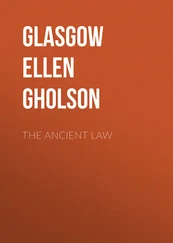Ellen Glasgow - The Sheltered Life
Здесь есть возможность читать онлайн «Ellen Glasgow - The Sheltered Life» весь текст электронной книги совершенно бесплатно (целиком полную версию без сокращений). В некоторых случаях можно слушать аудио, скачать через торрент в формате fb2 и присутствует краткое содержание. Жанр: Классическая проза, на английском языке. Описание произведения, (предисловие) а так же отзывы посетителей доступны на портале библиотеки ЛибКат.
- Название:The Sheltered Life
- Автор:
- Жанр:
- Год:неизвестен
- ISBN:нет данных
- Рейтинг книги:5 / 5. Голосов: 1
-
Избранное:Добавить в избранное
- Отзывы:
-
Ваша оценка:
- 100
- 1
- 2
- 3
- 4
- 5
The Sheltered Life: краткое содержание, описание и аннотация
Предлагаем к чтению аннотацию, описание, краткое содержание или предисловие (зависит от того, что написал сам автор книги «The Sheltered Life»). Если вы не нашли необходимую информацию о книге — напишите в комментариях, мы постараемся отыскать её.
The Sheltered Life — читать онлайн бесплатно полную книгу (весь текст) целиком
Ниже представлен текст книги, разбитый по страницам. Система сохранения места последней прочитанной страницы, позволяет с удобством читать онлайн бесплатно книгу «The Sheltered Life», без необходимости каждый раз заново искать на чём Вы остановились. Поставьте закладку, и сможете в любой момент перейти на страницу, на которой закончили чтение.
Интервал:
Закладка:
He was going without a glance at her; he had said, "Goodnight!" in his usual light-hearted voice; he had turned at the front door and smiled at the three of them, with an impartial wave of his hand. Now he was gone and the evening was over. Never had she suffered like this! Never before had she known how much easier it was to give him up than to be given up by him!
"Are you sleepy, Jenny Blair?" her mother asked. "You were so quiet."
"Yes, I'm sleepy. I'm so sleepy I can scarcely hold my eyes open."
"Then run straight upstairs. I suppose it was dull for you." Mrs. Archbald paused to bolt the front door. "I wish you would ask some nice boys to Sunday supper."
"I don't want to ask any boys. I despise boys," Jenny Blair replied fretfully, for she was on the point of tears. Yes, it was true, she had never, in all her seventeen years and ten months, been so unhappy. As she went slowly upstairs, after kissing her mother and her grandfather, she felt that savage loneliness stealing like moonlight into her mind. And downstairs in the hall her grandfather was saying cheerfully, "Time to turn in, William. I hope we'll get a breeze later on." "Why is it," she asked herself, with tragic intensity, "that only young people are ever really unhappy?"
A week went by, then a fortnight, and she was still asking this question. Why did she have to suffer such anguish when she expected nothing? Nothing but that glow, that flame, that ecstasy, which beat over her in waves whenever she looked into his eyes, whenever she heard his voice, whenever she stole into the cupboard and buried her flushed face in the brown wool. "It isn't my fault," she thought resentfully. "Nobody could wish to suffer like this. I didn't want to fall in love with him. I didn't want him to kiss me."
And now, after more than ten days of longing, of vacancy, of parching thirst for the sight of him, her mother inquired, in a tone of anxious tenderness, if she felt a pain anywhere.
"Do you feel let down, darling? Has the heat been too much for you?"
What could she answer? How could she tell her mother that she suffered because she was in love (though she expected nothing) with George Birdsong, whom she had known all her life? He was old enough to be her father; he was the husband of her mother's dearest friend; and he was the last man in the world even had he been unmarried and above reproach in his conduct that her mother would have desired as a son-in-law. No, she could not confess. She would endure anything, she would suffer every torture of hopeless longing, before she could be forced to confess. For her mother would only laugh, and worse than any pain would be the humiliation of her mother's laughter, which was wise and dry, like the sardonic laughter of age.
"No, I haven't a pain anywhere. I'm just tired."
"I don't like the sound of that, Jenny Blair." How brisk her mother was, how firm, how capable, and how undiscerning! "You may be feverish. Whether you like it or not, I'm going to take your temperature. I never thought it was safe for you to stay here in this terrible heat."
"There's nothing the matter. Anybody would be tired when it is so hot." But she was made to sit down and hold the thermometer in her mouth, while she shivered with fear lest the tiny glass tube should betray the passion of love.
"No, you haven't any fever." Mrs. Archbald appeared relieved, as indeed she was. "You will be all right, I hope, as soon as we get to the mountains. Etta is doing so well—her illness is the only thing hot weather seems to agree with—that the doctor thinks it will be safe for us to go the end of this week."
"Not this week? Why, to-day is Thursday." Jenny Blair's lips dropped apart, while her empty little face, with its flowerlike colour and softness, was transfixed by dread.
"You needn't worry, dear. I've had my things, and your grandfather's too, packed for days, just waiting until the doctor said Etta was well enough. It won't take me two hours to get you ready, and Cindy, who is going with us, can easily look after Etta. We shall all feel so much better as soon as we are out of this heat and settled comfortably in our cottage. Remember to shut your mouth," she commanded sternly; "when you hold it open like that, you look as if you hadn't a particle of sense.
"But I don't want to go, Mamma. I'd much rather stay here all summer."
"Jenny Blair!" Mrs. Archbald's voice was cool, crisp, and commanding. Though she seldom lost her serenity, and had acquired a commendable adroitness in handling both the old and the young, there were moments, she sometimes said, when everything seemed too much. The intense heat of the last fortnight, Etta's incessant demands for sympathy and service, and her daughter's inexplicable spells of caprice,--all these things had tried her, she felt, beyond anybody's enduring. True, she looked cool; but the coolness of her skin, which was naturally dry and did not flush easily, was as deceptive as the rosy cast of her philosophy. For one instant, scarcely longer than a drawn breath, she appeared almost disagreeable; then the artificial sweetness of her expression sprang back, as if it were held in place by an elastic band. "Jenny Blair," she repeated, "are you out of your head?"
"Not day after to-morrow, Mamma! Not on Saturday!"
Mrs. Archbald, who was hemming a napkin, fastened the square of damask over her knee with the fierce thrust of a black-headed pin. Not until the work was securely pinned to her lap was she able to bestow her undivided attention upon Jenny Blair.
"I wish I knew, my child, what is the matter with you."
"Nothing is the matter, Mamma. Only, please, please, don't go next Saturday. I can't get ready in time."
"You won't have any getting ready to do. I shall attend to all that, and you know perfectly well you have never lifted a finger to help with the packing. As soon as you are out of Queenborough, you will begin to feel better. Sometimes," she added gravely, biting her lower lip, "I think that it is a mistake to bring up girls as we do. We make them entirely too self-centred. If I didn't know better, I should be tempted to believe that you have some foolish notion about a boy in your head."
"Oh, Mamma, you know I haven't!"
"Yes, I am sure that you haven't. That is what I can't understand. Have you had a quarrel with John?"
Jenny Blair tossed her head. "No, I haven't—but suppose I had. What difference in the world would it make?"
"Then there's Fred Harrison. I hope you haven't made any trouble with Fred. His mother was my bosom friend when we went to school."
"Well, I haven't. He's only twenty-two, and I've always told you I couldn't abide boys."
"You're too young to have notions," Mrs. Archbald said sternly. "Why, you aren't even out yet, and it is the greatest mistake for girls to fall in love before they're old enough to know their own minds." Then, as she unpinned the napkin and gathered up her work-basket, her scissors, her thimble, and her needle and thread, she added warningly, "The trouble with you, Jenny Blair, is that you do not know the first thing about life. It is only by knowing how little life has in store for us that we are able to look on the bright side and avoid disappointment."
Long after she had gone, Jenny Blair stood gazing out of the window into the golden dust of summer. As if anybody but Mamma had ever found that there was a bright side to disappointment! That was the way people talked when they embraced resignation—and if there was a single virtue she disliked more than any other, she thought bitterly, that virtue was resignation. Hadn't she, when all was said, a right to a little happiness? A stab pierced her heart, and she knew that she could not—she simply could not go away without seeing him. No matter what her mother said or did for her good, no matter what any one else said or did, she could not go away without seeing him. If only he had not avoided her! If only he had shown her by the slightest sign that he had not forgotten! The faintest sign would have sufficed. The faintest sign that he remembered would have driven away this torment of longing. Her thoughts fluttered like living things in her mind, and while they fluttered and dropped and fluttered again out into the stillness, she changed into a prettier dress, and settled the hat with the flopping brim and the wreath of cornflowers at a more picturesque angle on the scalloped waves of her hair. Then, at last, after a questioning glance in the mirror, she picked up her beaded bag and a fan that was decorated with bluebirds, and ran downstairs and out of the house. "Anything is better than this," she thought, as she walked down the block to the Birdsongs' gate. "It isn't," she changed the bag and fan to her left hand, and opened the gate, "as if I were to blame. It isn't," she stooped to detach a muslin flounce from the thorn of a rose, "as if I had chosen to suffer like this."
Читать дальшеИнтервал:
Закладка:
Похожие книги на «The Sheltered Life»
Представляем Вашему вниманию похожие книги на «The Sheltered Life» списком для выбора. Мы отобрали схожую по названию и смыслу литературу в надежде предоставить читателям больше вариантов отыскать новые, интересные, ещё непрочитанные произведения.
Обсуждение, отзывы о книге «The Sheltered Life» и просто собственные мнения читателей. Оставьте ваши комментарии, напишите, что Вы думаете о произведении, его смысле или главных героях. Укажите что конкретно понравилось, а что нет, и почему Вы так считаете.












